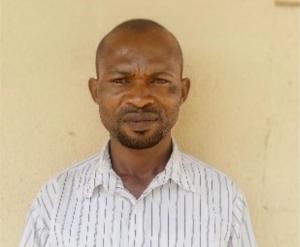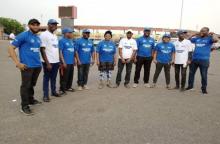Tuberculosis is not a death sentence -survivor’s path to recovery
Akwa, 6 April, 2022 - When 29 years old Mr Ede John Chimobi, a native of Mgbiji in Isuuzor Local Government Area (LGA), Enugu state, tested positive for tuberculosis (TB), he was shocked as he never considered himself to be at risk.
Mr Chimobi, who works as security personnel, had been feeling unwell - coughing at night, his chest was hurting, sweating, and not sleeping well.
He first got some drugs from chemist shops, but it worsened. He visited the hospital after a concerned neighbour advised him to seek medical attention at the hospital.
My neighbour said “you are coughing too much. Why not go to Mile 4 hospital? They will help you out”.
Mr Ede said he is glad he heeded the advice.
Following his physician’s assessment, as per the presentation of his signs and symptoms, he was tested for TB, and his result was positive.
“At the hospital, they explained to me that TB is airborne, and it can affect any one of us especially when we are in contact with an untreated patient. I had to take my brother to the hospital for testing as instructed by the nurse. He was also diagnosed of TB.
Mr Chimaobi had also infected his younger brother who was sleeping with him in same room before his diagnosis.
He was placed on a 6-month treatment of 4 combination drugs as an outpatient but strictly supervised by a family member.
For my own treatment, I was on admission in the hospital for 2 months as I was severely sick and provided with good food. After I was discharged, I went back to my normal lifestyle of drinking and smoking. I did not complete the remaining 4 months of the medications and so the disease resurfaced again,” he said.
Relapse
This time, Mr Chimaobi was diagnosed with Drug Resistant Tuberculosis (DR-TB). Usually DR-TB occurs when bacteria become resistant to the first line drugs used to treat TB.
“I went back to Mile 4 hospital, and the nurses told me that I had DR-TB because I had stopped taking the medications for complete duration of 6 months due to my bad lifestyle. I was re-admitted and treated for 4months and thereafter discharged to continue treatment in the community in a health facility close to where I reside for the remaining 7 months. Now that I am better, I have quit smoking and drinking alcohol.
I am now healthy and wish to reiterate that the first and second treatments I received were free,” he said.
Battling stigma
Getting back to the community was not easy as some of Mr Chimaobi's friends and family stigmatized him during his ailment.
Some friends and family members were avoiding me. It was only my mother that stood by me. My mother was very supportive. She took care of me until I recovered. The nurses advised my mother to wear a face mask to avoid getting infected since the disease is airborne.
Government and partners’ intervention
Tuberculosis (TB) is one of the top infectious killer diseases, and every day, about 4,100 women, men and children die, while 30,000 people fall ill from the disease. Nigeria ranks sixth amongst 30 countries with the highest-burden globally and first in Africa in the number of undetected cases.
Since Mr Chimaobi returned home, he said he has been using his experience to encourage people coughing to get tested.
“I used my story to encourage people with cough of 2 or more weeks’ duration to get tested and that TB is curable. For instance, after I came back from the hospital, a friend we used to share cigarettes with started coughing. I advised him to go to Mile 4 for a TB test, and he was adamant, claiming it was an ordinary cough. I insisted, narrating my experience to him and the common TB symptoms.
He finally agreed to go for the test and behold he was found to have TB. After receiving treatment, he felt better and was happy, claiming I preserved his life,” he said.
The World Health Organization (WHO), in collaboration with the National Tuberculosis, Buruli Ulcer and Leprosy Control Program (NTBLCP) and other partners working on TB control and elimination in Nigeria, have been providing support towards implementation of some strategic interventions to improve TB case findings in the country.
Mr Chimaobi is one of the TB survivors in the country who received excellent treatment and support services through the government implemented TB program that provides free TB services with support from partners and the WHO.
In 2021, Nigeria notified 207,785 TB cases; 50% higher compared to the notified 138,591 cases in 2020.
Technical Contacts:
Dr Oyama Enang; Email: oyamae [at] who.int (oyamae[at]who[dot]int)
Dr Eyo Nora Emmanuel; Email: eyon [at] who.int (eyon[at]who[dot]int)

